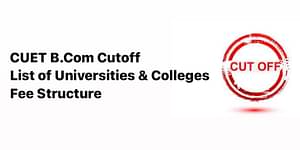MCom Syllabus & Subjects 2025
MCom syllabus and subjects include income tax, e-commerce, organisational behaviour, financial management, economic management, business environment, e-commerce, finance, strategic management, international business, and many more. These MCom subjects are divided into four semesters that are covered over two years.
M.Com Syllabus and Subjects
The M.Com syllabus covers subjects such as financial accounting, corporate accounting, taxation, business law, economics, and management, preparing aspirants for leadership roles in the corporate world. The MCom syllabus is designed in a way to provide advanced knowledge and skills in various aspects of commerce, finance, and business administration. The students get an understanding of the commerce and banking-related skills through the syllabus. The M.Com course focuses on theoretical and practical learning, helping students develop a strong base of knowledge in the core subjects of commerce. The syllabus helps students understand areas like auditing, financial management, and business ethics.
With a focus on contemporary trends and challenges, the M.Com syllabus provides students with the tools necessary for the ever-evolving business environment. Apart from the core commerce subjects, the M.Com course also offers electives in international business, human resource management, information technology, etc. The M.Com syllabus and subjects encourage research and analytical thinking, with a significant emphasis on developing critical problem-solving skills and a deep understanding of the financial markets.
For admission to the top MCom colleges in India, candidates must be well prepared for the entrance exams and clear them with flying colours. MCom entrance exams include CUET PG, OUCET, AMU Entrance Exam, etc. The M.Com entrance exam syllabus and subjectsinclude quantitative aptitude and interpretation topics, logical reasoning, business mathematics, statistics, etc. On the basis of the entrance exam results, candidates can enrol in MCom courses and qualify for positions like Bank Managers, Business Analysts, Tax Analysts, etc.
Table of Contents
- M.Com Syllabus and Subjects
- M.Com Syllabus and Subjects 2025 Highlights
- M.Com Year Wise Syllabus
- M.Com Core Subjects
- M.Com Course Subjects
- M.Com Optional Subjects
- M.Com Syllabus Specialisations
- M.Com Distance Syllabus and Subjects
- M.Com Entrance Exam Syllabus and Subjects
- MCom Syllabus Important Books
- Top MCom Colleges In India
- FAQs about M.Com Syllabus
M.Com Syllabus and Subjects 2025 Highlights
To get a detailed understanding of the M.Com syllabus and subjects 2025, check out the highlight below.
| Particulars | Details |
|---|---|
| Course Name | Master of Commerce (M.Com) |
| Course Duration | 2 years |
| Total Semesters | 4 semesters |
| M.Com Core Subjects |
|
| M.Com Elective Subjects |
|
| M.Com Specialisations |
|
M.Com Year Wise Syllabus
The M.Com syllabus is typically divided into two years (four semesters), with each semester focusing on different core subjects and electives to build a strong foundation in commerce, finance, and management. Below is an overview of the year-wise syllabus for the M.Com course.
M.Com First Year Syllabus
The M.Com first year syllabus consists of important subjects like advanced cost accounting, marketing management, financial management, strategic management etc.
| M.Com Syllabus - Semester 1 | |
|---|---|
| Organisational Behaviour and Management Process | Management and Financial Accounting |
| Marketing Management | Computer Applications in Commerce |
| Income Tax Law and Accounts | Business Environment & Policy |
| M.Com Syllabus - Semester 2 | |
| Research Methodology in Commerce | Management of Non-Profit Organisations |
| Corporate Laws | Managerial Accounting |
| Marketing Management | Quantitative Decision-Making Models |
M.Com Second Year Syllabus
The M.Com second year syllabus includes International Business, Strategic Management, etc.
| M.Com Syllabus - Semester 3 | |
|---|---|
| Corporate Governance | Financial Management |
| Strategic Management | Managerial Communication |
| International Trade- Theory & Practice | Goods and Service Tax (GST) |
| Auditing & Assurance Services | - |
| M.Com Syllabus - Semester 4 | |
| Income Tax Elements | E-Commerce |
| Mergers & Acquisitions | Quantitative Techniques |
| International Business | Advertising & Sales Management |
| Project / Dissertation | - |
M.Com Core Subjects
The M.Com core subjects are foundational courses that form the essential framework of knowledge and skills needed for students pursuing advanced studies in commerce, finance, and business administration.
M.Com Core Subjects and Syllabus
The M.Com core subjects and syllabus provide a comprehensive understanding of key business concepts and principles, offering students both theoretical and practical knowledge to excel in their careers. Below are the definitions of core subjects typically included in the M.Com syllabus:
| MCom Subjects | Description |
|---|---|
| Organisational Behaviour and Management Process | Studies human behaviour in organisations, leadership, and group dynamics. |
| Marketing Management | Analyses marketing strategies, consumer behaviour, and market research. |
| Management and Financial Accounting | Covers advanced financial accounting concepts like consolidation and cash flow analysis. |
| Income Tax Law and Accounts | Covers the various sections under Income Tax Law and accounting management. |
| Business Environment & Policy | Examines the impact of economic, legal, and technological factors on businesses. |
| Computer Applications in Commerce | Introduces advanced computer applications relevant to business, like data analysis and ERP systems. |
| Quantitative Decision-Making Models | Quantitative models like linear programming, integer programming, etc. |
| Research Methodology in Commerce | Provides tools and techniques for conducting business research. |
| Management of Non-Profit Organisations | Explores the unique challenges and management practices of non-profit organisations. |
| Corporate Laws | Information about corporate laws and regulations. |
| Managerial Accounting | Understanding accounting is important to managers for decision-making, cost savings, and profit maximisation. |
| Marketing Management | Covers basic principles and concepts of marketing, inculcating conceptual and analytical skills. |
| Corporate Governance | Examines the structure and best practices for corporate boards and management. |
| Strategic Management | Focuses on formulating and implementing effective business strategies. |
| International Trade- Theory & Practice | In-depth insights into international trading and finance |
| Financial Management | Deepens understanding of financial analysis, investments, and capital budgeting. |
| Goods and Service Tax (GST) | Information about GST and application, regulations, etc |
| Managerial Communication | Understanding the nuances of financial accounts and concepts for managerial communication. |
| Auditing & Assurance Services | Ensuring fair and transparent accounting and understanding of the process. |
| Income Tax Elements | Crucial components of income tax and understanding how to file it yourself |
| Mergers & Acquisitions | Information about mergers and acquisitions in the corporate or bank sectors. |
| E-Commerce | All about e-commerce and financial prospects in the field. |
| Quantitative Techniques | Techniques to understand finances in different ways. |
| Advertising & Sales Management | Creating budgets for sales and marketing. |
| International Business | Accounting, finance, and e-commerce are involved in international business. |
| Project / Dissertation | Students research a chosen topic related to their specialisation. |
M.Com Course Subjects
The topics covered under the M.Com syllabus have been discussed below:
| M.Com Subjects | Topics Covered |
|---|---|
| Organisational Behaviour and Management Process |
|
| Managerial Accounting & Decision-Making |
|
| Corporate Tax Planning |
|
| Accounting Theory & Practice |
|
| Computer Applications in Business |
|
| Business Environment |
|
| Corporate Laws |
|
| Managerial Economics |
|
| Financial Management |
|
| Marketing Management |
|
| Security Analysis & Portfolio Management |
|
| Organisation Theory And Behaviour |
|
| Income Tax Law and Practice |
|
| Cost and Management Accounting |
|
| Advanced Financial Management |
|
| Strategic Management |
|
| International Business |
|
M.Com Optional Subjects
The optional M.Com syllabus can be chosen by candidates according to their preferences. Whatever a student is passionate about, they can choose them and carry forward with their studies. The M.Com optional subjects have been discussed in the table below:
| M.Com Optional Subjects | Topics |
|---|---|
| Banking and Finance |
|
| Entrepreneurial Management |
|
| Environmental Economics |
|
| IT Systems & Business Technology |
|
| International Finance |
|
| Financial Markets |
|
| Human Resource Management |
|
| Strategic Cost Management |
|
M.Com Syllabus Specialisations
Several specialisations are available for students aspiring to do M.Com. Candidates can choose any of the fields according to their specific areas of interest within the commerce field. Some of the most popular MCom specialisations include:
| M.Com Specialisation | M.Com Specialisation Subjects |
|---|---|
| M.Com in Finance |
|
| M.Com in Banking & Insurance Management |
|
| M.Com in Taxation & Insurance |
|
| M.Com in Business Analytics |
|
| M.Com Computer Applications & IT |
|
| M.Com Human Resource Management |
|
| M.Com in Business Management |
|
| M.Com in International Business |
|
| M.Com in Marketing Management |
|
| M.Com in Economic Administration and Financial Management |
|
M.Com Distance Syllabus and Subjects
MCom in the distance mode allows candidates to pursue the degree flexibly. The M.Com distance syllabus and subjects are similar to the regular program. The semester-wise breakdown is provided here so students know what to expect from the course.
M.Com Distance First Year Syllabus
Find below the M.Com distance mode first year syllabus:
M.Com Distance Subjects - Semester 1 | |
|---|---|
| Business Communication | Develops communication skills for professional settings. |
| Financial Accounting | Introduces basic concepts of financial accounting. |
| Computer Applications in Business | Introduces basic computer skills for business tasks. |
| Managerial Economics | Analyses economic principles applied to business decisions. |
| Business Mathematics and Statistics | Provides essential mathematical and statistical tools for business analysis. |
M.Com Distance Subjects - Semester 2 | |
| Cost Accounting | Explores cost accounting principles and techniques. |
| Organisational Behaviour | Studies human behaviour in organisations and group dynamics. |
| Marketing Management | Introduces marketing concepts, strategies, and consumer behaviour. |
| Business Law | Examines legal principles relevant to business operations. |
| Elective | Choose one elective based on interest (e.g., International Business, Taxation). |
M.Com Distance Second Year Syllabus
Here is the list of MCom distance course subjects for the second year divided into third and fourth semesters:
M.Com Distance Subjects - Semester 3 | |
|---|---|
| Advanced Financial Accounting | Deepens understanding of complex accounting topics. |
| Strategic Management | Explores strategic planning, competitive analysis, and implementation. |
| Financial Management | Analyses financial markets, investments, and capital budgeting. |
| Research Methodology | Provides tools and techniques for conducting business research. |
| Elective | Choose one elective based on interest (e.g., Corporate Finance, Human Resource Management). |
M.Com Distance Subjects - Semester 4 | |
| Project/Dissertation | Conduct independent research on a chosen business topic. |
| Elective | Choose one elective based on interest. |
M.Com Entrance Exam Syllabus and Subjects
The M.Com Entrance Exam Syllabus 2025 may vary depending on the university and the specific MCom programme the candidate applies for. However, some general topics they can expect to see on the exam include:
| Subjects | Topics |
|---|---|
| Quantitative Aptitude and Data Interpretation |
|
| Logical Reasoning |
|
| English Language and Comprehension |
|
| General Awareness |
|
| Business Mathematics and Statistics |
|
| Management Concepts |
|
| Accounting |
|
Specific information about M.Com entrance exams for particular universities can be checked out through the following resources:
- University Websites: Most universities have a different website and page for their MCom program, which ought to describe the syllabus of the entrance examination to the MCom program, and even the other processes needed to be followed for getting admission into them.
- Official MCom Entrance Exam Brochures: Generally, there is a brochure prepared by most universities providing detailed information about the entrance examination: the syllabus, model questions, and so forth. Most universities update this on their respective university websites, especially the entrance exam cell websites.
- Coaching Institutes: Some coaching institutes prepare students for both the subjects and training needed to pass an MCom entrance exam.
MCom Syllabus Important Books
Here are some important M.Com books written by Indian authors, categorised by subject:
| Subject | Name of the Books |
|---|---|
| Financial Management |
|
| Accounting |
|
| Economics |
|
| Marketing Management |
|
| Organizational Behavior |
|
| Strategic Management |
|
| Additional Resources |
|
Top MCom Colleges In India
The top MCom colleges in India whose curriculum, electives, and in-house placement opportunities are top-notch are given below. This list is based on NIRF 2024 ranking for colleges:
| NIRF Ranking 2024 (Colleges) | College Name | MCom Fees |
|---|---|---|
| 1 | Hindu College, Delhi | Rs. 48, 500 |
| 5 | Atma Ram Sanatan Dharm College, New Delhi | Rs. 15,000 |
| 6 | St. Xavier’s College, Kolkata | Rs. 48,000 |
| 8 | Loyola College, Chennai | Rs. 12,580 |
| 12 | Hansraj College, Delhi | Rs. 26,074 |
| 13 | Presidency College, Chennai | Rs. 2,60,000 |
| 15 | Thiagarajar College, Madurai | Rs. 32,000 |
| 16 | Deshbandhu College, New Delhi | Rs. 12,087 |
| 19 | Shri Ram College of Commerce, Delhi | Rs. 58,800 |
| 25 | St. Joseph’s College, Tiruchirapalli | Rs. 10,350 |
FAQs about M.Com Syllabus
Can I do my MCom in one year?
Completion of an MCom within one year depends on things like the mode of entry and university. While the traditional programs consume 2 to 3 years, there are options like IGNOU's lateral entry or some specific one-year programs. Specific universities and modes have to be researched for accurate information.
Is an MCom a valuable degree?
Yes, an MCom does add value in that it expands your management knowledge, enhances career prospects, and opens opportunities leading to more remunerative positions such as finance analyst or marketing manager. However, the actual value really depends on the speciality opted for, skills, and the institution chosen.
How many semesters does an MCom have?
An MCom is usually a two-year program with four semesters. Each semester comprises a group of core and specialisation subjects. The span of the program is organised so that in-depth learning of its subjects and development of skills take place in the various areas of business and commerce.
Does MCom have Math?
It does; some mathematics is involved in the MCom course, but the extent of it is by far less than in engineering or other streams. You will do basic statistics, probability, and financial calculations, but the use of it is more towards applying the concept to business decisions rather than proving mathematical concepts. Think practical application over theoretical complexities.
Thus, while one might not be required to solve calculus equations, a basic understanding of the numbers does count for successfully going through M.Com.
What are the subjects and syllabus in MCom 1st year?
In the 1st year, you have core subjects like Financial Management, Advanced Accounting, Managerial Economics, and Research Methodology. You will also be initiated into some of the M.om. Elective Subjects on Marketing, Organisational Behaviour, and Strategic Management lay the bedrock for deeper specialisation in the chosen track later.
What are the subjects in MCom?
MCom goes in-depth into basic subjects of finance, accounting, economics, and marketing. You will also delve into specialised M.Com subjects like Corporate Finance, Digital Marketing, or HR Management based on your chosen track.
Popular Courses
M.Com Colleges in States
M.Com Colleges in Cities
- Courses
- Master of Commerce
- Syllabus










